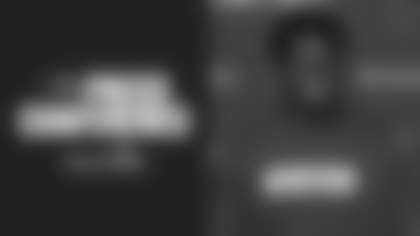- Despite being in different divisions, the Bucs and Rams are meeting for the fourth time in five years
- The Rams have been the opponent in two of the Bucs' three NFC Championship Game appearances
- Tampa Bay's 38-35 MNF shootout win over the Rams in 2000 remains one of the most exciting games ever played at Raymond James Stadium
The Tampa Bay Buccaneers and St. Louis Rams will meet in 2014 for the third year in a row and the fourth time in the last five seasons. That's an unusual streak for two non-division opponents, but it's also a recurring theme between these two franchises. No matter who prevails on Sunday, both teams can hope that this current run of games between them will once again portend some postseason drama.
The Bucs and Rams have met 21 times, including twice in the postseason – both in NFC Championship Games, as a matter of fact (more on that below). The Rams have extended their lead in the regular-season series to 11-8 with wins in each of the last two years, and they also made it to the Super Bowl both times that prize was on the line against the Buccaneers. Prior to the last two meetings, the Bucs had won six of the previous eight meetings.
The first run of nearly-annual get-togethers began in the Bucs' second season of existence, which allowed the then-Los Angeles Rams to get an early lead on the series. The Buccaneers were still seeking their first franchise win in November of 1977 when Head Coach John McKay took his team back to the site of his college glory days at USC, the L.A. Coliseum. McKay even started a former Trojan at running back in Ricky Bell and backed him up with another USC back in Anthony Davis but it wasn't nearly enough against the playoff-bound Rams, who won 31-0.
The Bucs went back to the Coliseum one year and one day later, and this time were far more competitive, even though the '78 Rams would go all the way to the NFC Championship Game. Rams DE Fred Dryer broke QB Doug Williams' jaw, and his replacement, Mike Rae, threw a 23-yard touchdown pass to McKay's son, J.K. McKay, to tie the game in the fourth quarter. However, the Rams countered with a 27-yard field goal by Frank Corral to win it with three seconds left.
The Rams' first visit to Tampa came in 1979, when the Buccaneers had joined the Rams as a playoff contender. In fact, Tampa Bay's eye-opening 5-0 start to the season included a 21-6 win over Los Angeles in Week Four that announced the coming dominance of the Buccaneers' defense. The Rams gained just 11 first downs and 186 yards on the day and only scored on an interception return by Jim Youngblood. Williams threw that pick and finished with a strange line of five completions in 20 attempts, but a pair of touchdown tosses to Larry Mucker and Jimmie Giles. The Bucs and Rams would meet again in the NFC Championship Game, again in Tampa, but unfortunately it was the Los Angeles defense that dominated that one. The Bucs lost Williams to injury again (as well as star DE Lee Roy Selmon) and managed to complete only five of 27 passes this time. Los Angeles scored only a trio of Corral field goals but won 9-0 by holding the Bucs to 177 total yards.
The growing Bucs-Rams rivalry was deemed interesting enough to put them on a Thursday night ABC broadcast the following September, and Tampa gained a small measure of revenge with a 10-9 victory at Tampa Stadium keyed by Williams' one-yard touchdown run in the fourth quarter. Corral once again hit three field goals for the Rams' only points, but this time it wasn't enough.
The two teams also met every year from 1984-87, but by this point the Bucs had slipped into a long run of losing seasons while the Rams remained playoff contenders. The Rams proceeded to win six in a row during the '80s and early '90s, though many of the games were very close, such as a 34-33 Rams win in Tampa that ended up turning on a blocked extra point on the first of James Wilder's two touchdowns. Steve DeBerg threw for 322 yards, compared to 68 for Rams starter Jack Kemp, but Eric Dickerson more than made up for that difference by compiling 191 of the Rams' 299 rushing yards. That remains tied for the second-most rushing yards the Buccaneers have ever allowed in a single game.
L.A.'s winning streak ran into the '90s and reached six games on one of the more disappointing evenings in Buccaneer franchise history. In a Sunday night game broadcast nationally by ESPN, Tampa Bay built a 27-3 halftime lead, highlighted by TE Tyji Armstrong's 81-yard touchdown pass in which two defenders hit him simultaneously from opposite sides and simply fell off to allow him to continue downfield. However, a frenzied Rams offense scored three touchdowns in the third quarter and then won the game in the fourth period on Jim Everett's third touchdown pass of the night. A 100-yard game by RB Reggie Cobb went for naught.
The Bucs broke the Rams' streak in 1994 with a 24-14 powered by two touchdown receptions by Charles Wilson, as Wilson's 176 yards and Errict Rhett's 119 on the ground accounted for almost all of Tampa Bay's 355 total yards on the day. The two teams would not meet again for five more seasons, however, and by then the Rams had moved to St. Louis and the Bucs had risen to prominence again. In '99, the second long run of meetings began, and this one was punctuated by much drama.

Bobby Rainey and the Buccaneers lost their most recent game against the Rams, 23-13, last season in St. Louis
In fact, when the Bucs and Rams met again in 1999 – actually, shortly after Y2K as this was the postseason – another Super Bowl berth was on the line. Tampa Bay and its swarming defense traveled to St. Louis to face Kurt Warner and "The Greatest Show on Turf" in the 1999 NFC Championship Game. To the surprise of many, given that the 1999 Rams came into that game scoring more than 30 points a game, this second Bucs-Rams NFCC meeting was another defensive struggle…and this time it looked like Tampa Bay might come out on top. The Bucs held dangerous back Marshall Faulk to 49 combined yards and picked off Warner three times in route to building a 6-5 fourth-quarter lead despite just 203 yards of offense on the day. The Rams got the final points they needed, however, on a 30-yard TD pass to WR Ricky Proehl that just cleared the outstretched fingers of CB Brian Kelly, and Tampa Bay's last-ditch attempt to come back was killed by an infamous replay reversal of a Bert Emanuel catch inside the Rams' 20.
Both teams were gunning for the playoffs the following December when the Rams came to Raymond James Stadium for the first time, a game the NFL happily put on Monday Night Football. They were not disappointed, as the exact opposite of the 1999 NFC Championship Game emerged: A shootout. And, after the Rams had barely prevailed in the previous defensive struggle, it was the Buccaneers who surprisingly came out on top in a 73-point game. This time Faulk broke free for four touchdowns but Warrick Dunn countered with three scores of his own, including the one-yard TD dive with 48 seconds left that won the game for the home team. That touchdown completed a drive that was kept alive by one of the single most memorable plays in franchise history, Dunn's improvised toss to QB Shaun King in the backfield that turned a potential big loss into a long gain when King scrambled around the end and absorbed a late-hit penalty on the sideline. The game wasn't over until S John Lynch picked off a deep Warner pass with 25 seconds left, right after Isaac Bruce had dropped another bomb that looked like it could go the length of the field. The two teams combined for 832 yards of offense, 446 by the Buccaneers.
The series continued in 2001 and 2002 and, not surprisingly, the NFL kept jumping on the chance to put the Bucs and Rams on Monday Night Football. Tampa Bay won them both, 24-17 in St. Louis in 2001 and 26-14 in Tampa in 2002. In the former game, Dunn's 21-yard TD run to the right pylon in the fourth quarter broke a 17-17 tie; the play might have been questionable on review, but the Rams had already used up their challenges. Warren Sapp had two sacks in the game and John Lynch once again sealed it with a late interception, one of five takeaways by the Bucs' defense. In the latter game, which came early in the Bucs' 2002 run to the Super Bowl title, the Bucs once again went sack- and pick-happy, dropping Warner five times and picking him off four times. The last of those was a dramatic pick-six for Derrick Brooks, who had just come back into a game despite a gimpy hamstring. Brooks intercepted the pass, ran into the end zone and then kept going right into the tunnel and to the training room.
The Rams finally broke the Bucs' winning streak in 2004 with a 28-21 victory in St. Louis, marking the last time Tampa Bay had visited the Gateway City before last year's reunion. The Rams got the winning points on Marc Bulger's 36-yard TD pass to Torry Holt in the fourth quarter, but the Bucs got back into St. Louis territory twice before the game ended. One ended on a Brian Griese interception, the other on a Tim Brown fumble.
The Rams were in the process of bottoming out (3-13, 2-14, 1-15 from 2007-09) when they came back to Tampa in September of '07, and the Bucs took advantage with an easy 24-3 victory behind the potent three-headed rushing attack of Earnest Graham, Michael Pittman and Cadillac Williams. It was a lot tougher when the Rams came back in 2010, as the home team had to rally from a 17-3 deficit to get an 18-17 win. Williams scored the winning points on a one-yard catch with 10 seconds left in the game, capping an 81-yard drive. That was the start of the latest run of meetings, as the Rams were back in Tampa in 2012, taking a 28-13 victory in Week 16 that capped a five-game losing streak for the Buccaneers after a 6-4 start to the season. Last year, the Bucs went to St. Louis late in the year and fell, 23-13.
Bucs' Game-by-Game Record vs. St. Louis*:
|
Year |
Result |
Site |
|
1977 |
L, 31-0 |
Los Angeles |
|
1978 |
L, 26-23 |
Los Angeles |
|
1979 |
W, 21-6 |
Tampa |
|
1979 # |
L, 9-0 |
Tampa |
|
1980 |
W, 10-9 |
Tampa |
|
1984 |
L, 34-33 |
Tampa |
|
1985 |
L, 31-27 |
Tampa |
|
1986 |
L, 26-20 |
Los Angeles |
|
1987 |
L, 35-3 |
Los Angeles |
|
1990 |
L, 35-14 |
Tampa |
|
1992 |
L, 31-27 |
Tama |
|
1994 |
W, 24-14 |
Tampa |
|
1999 # |
L, 11-6 |
St. Louis |
|
2000 |
W, 38-35 |
Tampa |
|
2001 |
W, 24-17 |
St. Louis |
|
2002 |
W, 26-14 |
Tampa |
|
2004 |
L, 28-21 |
St. Louis |
|
2007 |
W, 24-3 |
Tampa |
|
2010 |
W, 18-17 |
Tampa |
|
2012 |
L, 28-13 |
Tampa |
|
2013 |
L, 23-13 |
St. Louis |
* The Rams were located in Los Angeles prior to 1995
# Postseason
Series Notes:
- Overall Regular Season Series: St. Louis leads, 11-8
- Postseason Record: St. Louis leads, 2-0
- Bucs' Home Record (Regular Season): 7-5
- Bucs' Road Record (Regular Season): 1-6
- Current Streak: Lose 2 (2012-13)
- Buccaneers' Longest Winning Streak: 3 (2000-02)
- Rams' Longest Winning Streak: 6 (1984-92)
- Regular Season Point Total: Buccaneers 379, Rams 443
- Most Points in a Game, Buccaneers: Buccaneers 38-35 (2000)
- Most Points in a Game, Rams: Buccaneers 38-35 (2000)
- Most Points, both teams: Buccaneers 38-35 (2000)
- Fewest Points in a Game, Buccaneers: Rams 31-0 (1977)
- Fewest Points in a Game, Rams: Buccaneers 24-3 (2007)
- Fewest Points in a Game, both teams: Buccaneers 10-9 (1980)






















